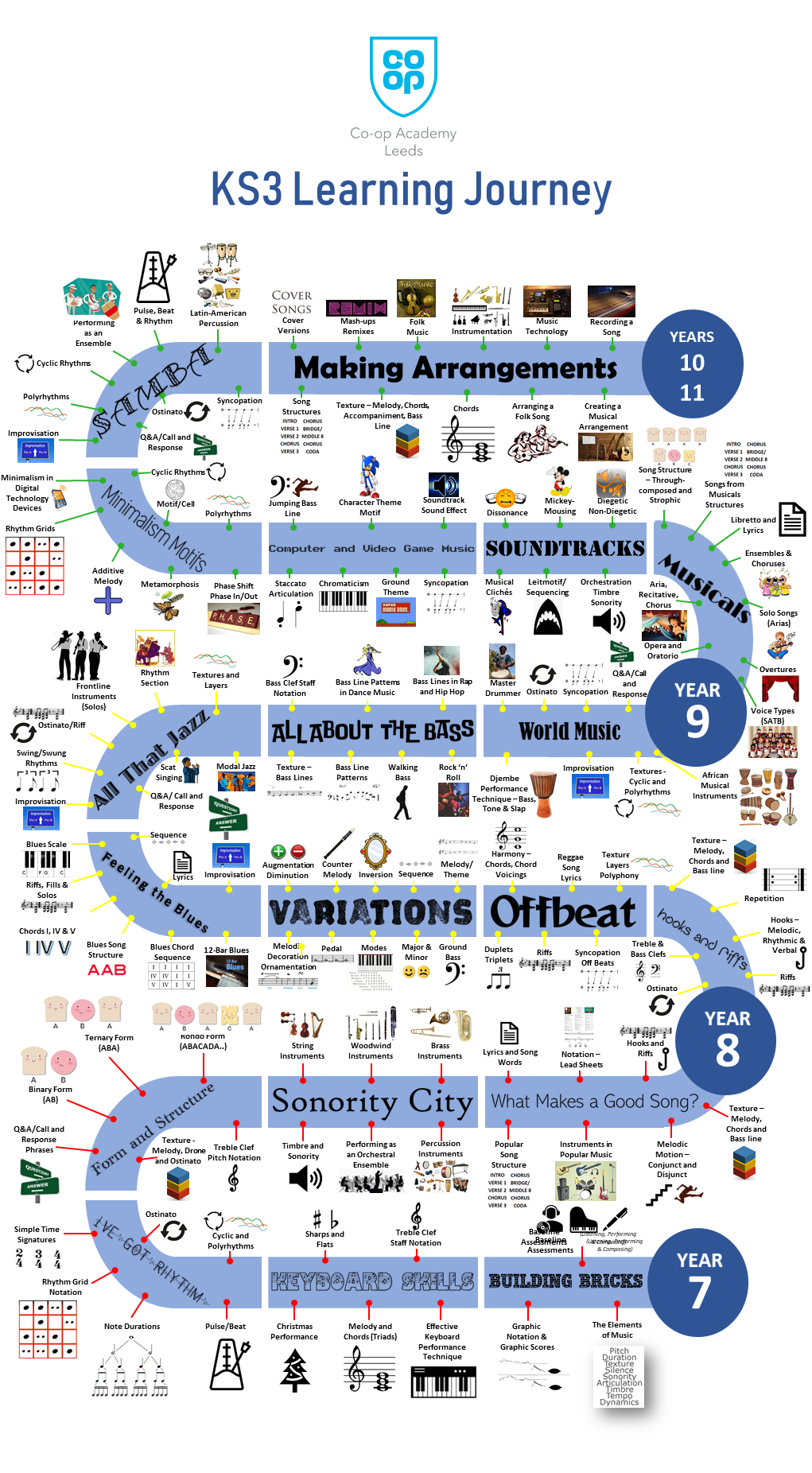Performing Arts - Music
KS3 Curriculum
The music curriculum at Co-op Academy Leeds has a highly practical approach to lessons, being inspired by Musical Futures pedagogy. Students are involved in listening, singing and performing from day one. Theoretical knowledge is used to support practical learning. Students learn how to play keyboard, guitar, bass, ukulele and drums and use these skills to play together in ensemble settings. They learn how to use their voices correctly and body percussion, they also have the chance to use instruments from around the world. In addition to classroom lessons, students have the opportunity to further study an instrument of their choice with our peripatetic teachers. Currently we offer lessons in singing, piano, drums, guitar (including bass) and steel pans.
Students have lots of in-house performance opportunities such as concerts, assemblies and in the annual Culture Festival. There are also opportunities to perform outside of school in festivals and competitions.
Key skills & concepts of learning:
– Develop knowledge and understanding
– Perform, compose and listen to music
– Develop instrumental and vocal skills
– Explore cultures, musical styles and traditions
– Play with accuracy & expression
– Develop confidence, resilience, self-discipline and teamwork
Key Themes/Topics Year 7
What is Music?, Vocalize and elements of music, Keyboard skills and reading notation, Exploration of rhythm and pulse, Instruments of the orchestra, What makes a good song?
Key Themes/Topics Year 8
Ostinatos, Hooks and Riffs, Reggae, Variations, Blues music, Jazz, World Music
Key Themes/Topics Y9
Making arrangements, Musicals, Arts Award course.
Assessments
Students will undergo regular low stakes assessment in all lessons. Students will be expected to recall previous knowledge in the form of vocabulary, spelling and key terms tests. This may be in the form of multiple choice and short answer quizzes at the start of every lesson. Our hope is that frequently revisiting music content will help secure this learning in the long-term memory.
Students are assessed on their performance, composition and listening skills at the end of each topic area depending on the key focus area. Assessment will be through a final performance and evaluation. Videos will be taken throughout to show progress.
KS4 Curriculum
Students complete 2 mandatory units and choose 1 optional unit between 204ta and 205ta
201ta Musical Knowledge : Students will articulate their thoughts and feelings about music using the appropriate industry & theoretical language whilst drawing upon knowledge learned within this unit. Students study musical styles and the various distinctive traits that comprise them. Through study of this unit learners will build a wider contextual and theoretical knowledge of contemporary music. This knowledge will be demonstrated through the ability to identify and analyse the key stylistic and musical elements present within contemporary music.
202ta controlled assessment : Through the study of this unit students will engage with a full live performance project including planning, rehearsal, performance, and evaluation. The skills learned within this unit can be directly applied to any future pursuits in the live music industry.
The rehearsal elements of the unit are designed to develop the learner’s ability to rehearse effectively. Learners will develop their
planning, organisation, communication and evaluation skills throughout the rehearsal process. The purpose of the unit is to prepare
learners for the undertaking of a live musical performance in front of an audience.
Optional units: students must choose one of 204ta or 205ta
204ta Instrumental Study : This unit aims to enhance the student’s capacity to understand how to maximise their development as an instrumentalist, to recognise success and to encourage improvement in areas which require further work through objective and reflective self-assessment. The purpose of this unit is to facilitate the learner’s ongoing development as an instrumentalist, based around their own goals and objectives using structured planning and reflection of personal development. This will in turn facilitate the capacity to use their instrument as their primary tool for creating and/or performing music.
205ta Composition : The aim of this unit is to facilitate an awareness of compositional protocols in a specific musical style. The purpose of the unit is to create music which is reflective (a pastiche) of existing work in the chosen style.
Students will compose a song or an instrumental piece of a minimum of two and a half minutes duration, reflective of a defined musical style suggested by the tutor, using at least 3 of the following:
Rhythm track
Bass line
Harmonic progression
Melody
Lyrics

Recommended revision materials and websites
Musicroom.com, Sheetmusic.co.uk, Yousician.com, LCM.ac.co.uk, You tube, Radio 1 live lounge
Music Enrichment
Guitar lessons, Drum lessons, Clarinet Lessons, Steel pan Lessons, Samba Club, VoCAL crew – choir, Live lounge- opportunity for students to rehearse as a band, Keyboard Club, DJ club, Music technology using Pro tools on the MACs, Rehearsals for school production singing/dancing/acting.